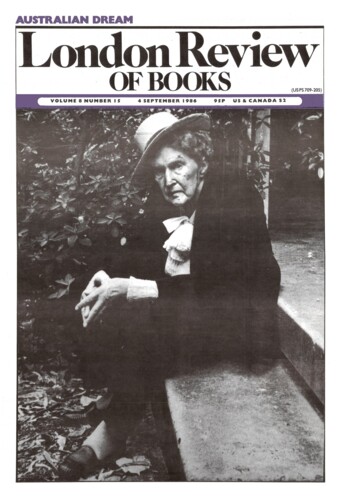Colin McGinn
Colin McGinn a reader in philosophy at University College London, is soon to take up the position of Wilde Reader in Mental Philosophy at Oxford. He is the author of Wittgenstein on Meaning.
Misled
21 April 1988
Diary: A Philosopher in LA
Colin McGinn, 4 September 1986
I have recently been to two valedictory parties for Oxford philosophers on the brink of emigrating to America. I spoke to another philosopher who is actively considering a munificent offer from a Californian university. Reliable rumour has it that a number of other leading British philosophers are contemplating taking their talents to the Land of the Free. And they have been preceded there by several others in the past few years. British philosophy appears to be packing up and moving across the Atlantic. Neither is this minor exodus being compensated for by American philosophers taking up posts in Britain. There are too few such posts, and those there are are not attractive to American philosophers. The consensus seems to be that it is better to be a philosopher in America than Britain right now and for the foreseeable future.
Outpouchings
Colin McGinn, 23 January 1986
It could be said that Oliver Sacks put neuropathology on the literary map. His first book Awakenings, about the stunning effects of the drug L-Dopa on patients afflicted with a form of Parkinsonism, attracted considerable critical acclaim from the literary world, and ‘inspired’ Harold Pinter’s rather ponderous play A Kind of Alaska. Sack’s second book A Leg to Stand On was similarly well-received. He has published a number of short pieces in this journal, as well as in its elder American sibling, several of which are reprinted in the present collection, along with 12 previously unpublished pieces. (His book Migraine seems to have excited rather less popular interest, no doubt because it is a less popular kind of book.) Yet the scientists of the nervous system do not seem to have been similarly impressed. When I asked a colleague in neuro-anatomy what he thought of Sack’s work he said he had never heard of him, and the neuroscientists I consulted who had heard of him were not inclined to attach any scientific importance to his writings. Unanimity between the two cultures is not perhaps to be expected, but in the present case the reason for this asymmetry of esteem lies deeper than mere difference of interest. The problem is that it is quite unclear what Sacks is doing. For whom is he writing? What kind of writing is it? Is it intended as sober science or fanciful fiction? What is its relation to an orthodox text of neuropathology? Can it really be taken seriously? Literary people seem tolerant of such uncertainties, but those concerned to discover the literal truth will want them clarified.
Weak Wills
Colin McGinn, 5 September 1985
Donald Davidson has this year been George Eastman Visiting Professor at Oxford: only the second philosopher to hold the august position (the first being W.V. Quine, a teacher of Davidson’s at Harvard and his greatest philosophical influence). This honour reflects his present stature in the academic world. Last year he was the subject of a massive conference held in New Jersey, organised by the indefatigable Ernie Lepore. It was probably the largest philosophical conference ever held, and it attracted nearly all of the world’s leading philosophers. Most of the papers delivered were addressed (often critically) to some aspect of Davidson’s work. For a philosophical event, it was undoubtedly a great occasion, if a somewhat overwhelming one (especially for Davidson, who attended as many of the papers as was humanly possible). Probably no other philosopher now working has been discussed as much during the last decade.
Pieces about Colin McGinn in the LRB
Avoiding Colin
Frank Kermode, 6 August 1992
Once there were popular books with titles like Straight and Crooked Thinking, books in which professional philosophers, avoiding arcane speculation, tried to make the rest of us more sensible by...
Too hard for our kind of mind?
Jerry Fodor, 27 June 1991
Whatever, you may be wondering, became of the mind-body problem? This new collection of Colin McGinn’s philosophical papers is as good a place to find out as any I know of. Published over a...
Putnam’s Change of Mind
Ian Hacking, 4 May 1989
Big issues and little issues: among established working philosophers there is none more gifted at making us think anew about both than Hilary Putnam. His latest book is motivated by large...
An End to Anxiety
Barry Stroud, 18 July 1985
Wittgenstein predicted that his work would not be properly understood and appreciated. He said it was written in a different spirit from that of the main stream of European and American...
Persons
Brian O’Shaughnessy, 1 April 1983
The philosophy of mind is a branch of the philosophy of nature. But it has this peculiarity, that the very item that conjures up its questions and vets its answers is the very part of nature...
Read anywhere with the London Review of Books app, available now from the App Store for Apple devices, Google Play for Android devices and Amazon for your Kindle Fire.
Sign up to our newsletter
For highlights from the latest issue, our archive and the blog, as well as news, events and exclusive promotions.





